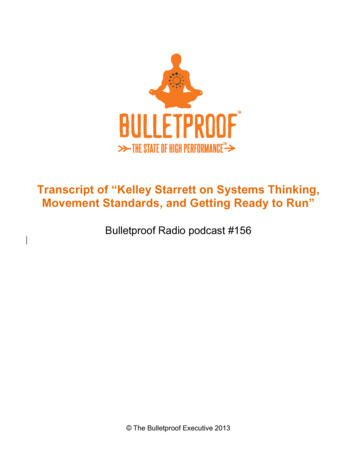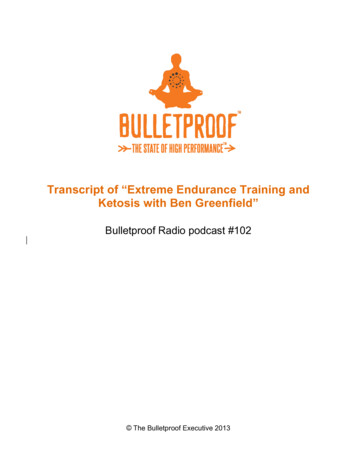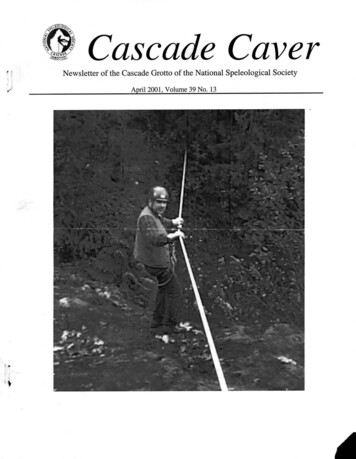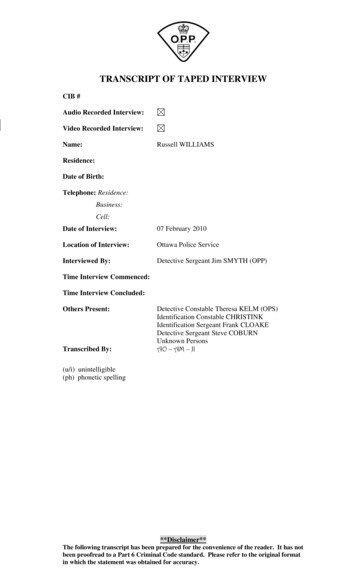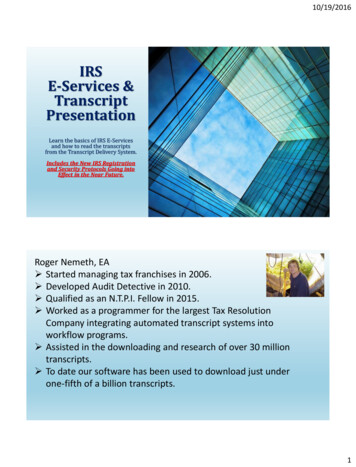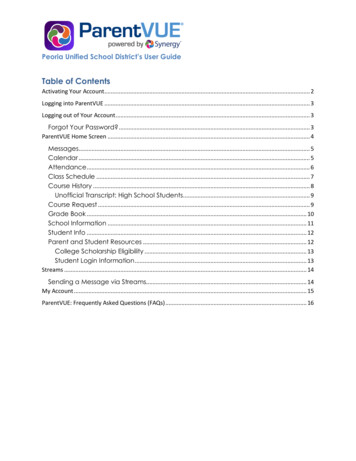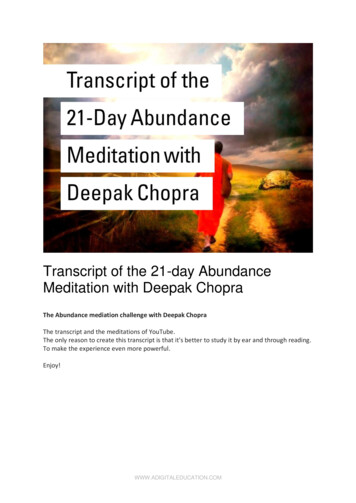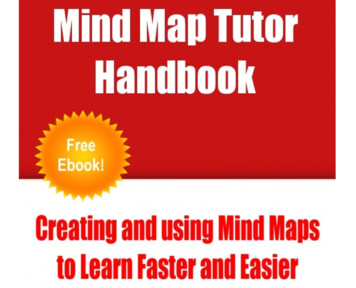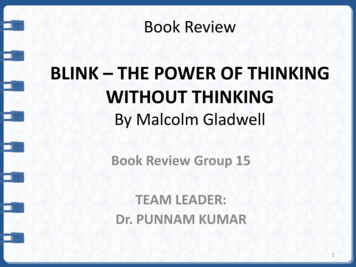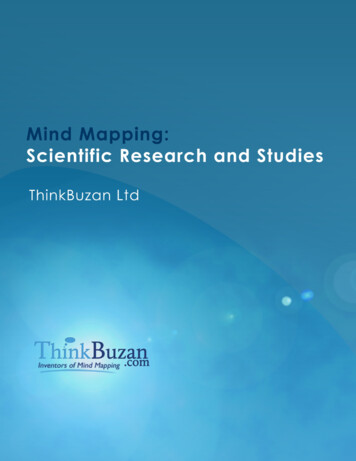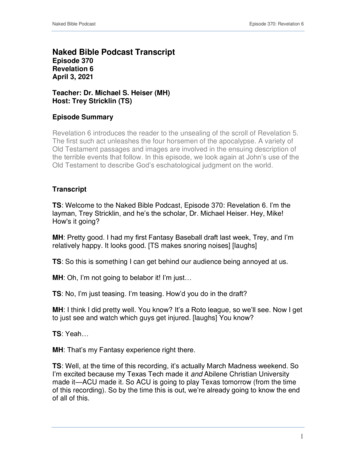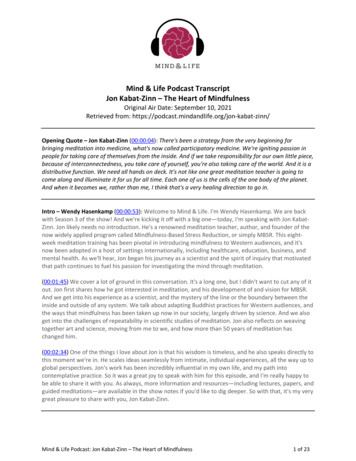
Transcription
Mind & Life Podcast TranscriptJon Kabat-Zinn – The Heart of MindfulnessOriginal Air Date: September 10, 2021Retrieved from: ning Quote – Jon Kabat-Zinn (00:00:04): There's been a strategy from the very beginning forbringing meditation into medicine, what's now called participatory medicine. We're igniting passion inpeople for taking care of themselves from the inside. And if we take responsibility for our own little piece,because of interconnectedness, you take care of yourself, you're also taking care of the world. And it is adistributive function. We need all hands on deck. It's not like one great meditation teacher is going tocome along and illuminate it for us for all time. Each one of us is the cells of the one body of the planet.And when it becomes we, rather than me, I think that's a very healing direction to go in.Intro – Wendy Hasenkamp (00:00:53): Welcome to Mind & Life. I'm Wendy Hasenkamp. We are backwith Season 3 of the show! And we're kicking it off with a big one—today, I'm speaking with Jon KabatZinn. Jon likely needs no introduction. He's a renowned meditation teacher, author, and founder of thenow widely applied program called Mindfulness-Based Stress Reduction, or simply MBSR. This eightweek meditation training has been pivotal in introducing mindfulness to Western audiences, and it'snow been adopted in a host of settings internationally, including healthcare, education, business, andmental health. As we'll hear, Jon began his journey as a scientist and the spirit of inquiry that motivatedthat path continues to fuel his passion for investigating the mind through meditation.(00:01:45) We cover a lot of ground in this conversation. It's a long one, but I didn't want to cut any of itout. Jon first shares how he got interested in meditation, and his development of and vision for MBSR.And we get into his experience as a scientist, and the mystery of the line or the boundary between theinside and outside of any system. We talk about adapting Buddhist practices for Western audiences, andthe ways that mindfulness has been taken up now in our society, largely driven by science. And we alsoget into the challenges of repeatability in scientific studies of meditation. Jon also reflects on weavingtogether art and science, moving from me to we, and how more than 50 years of meditation haschanged him.(00:02:34) One of the things I love about Jon is that his wisdom is timeless, and he also speaks directly tothis moment we're in. He scales ideas seamlessly from intimate, individual experiences, all the way up toglobal perspectives. Jon's work has been incredibly influential in my own life, and my path intocontemplative practice. So it was a great joy to speak with him for this episode, and I'm really happy tobe able to share it with you. As always, more information and resources—including lectures, papers, andguided meditations—are available in the show notes if you'd like to dig deeper. So with that, it's my verygreat pleasure to share with you, Jon Kabat-Zinn.Mind & Life Podcast: Jon Kabat-Zinn – The Heart of Mindfulness1 of 23
Wendy Hasenkamp (00:03:17): Well, I am here with Jon Kabat-Zinn. Jon, it is such a pleasure and anhonor to be with you. Thanks so much and welcome.Jon Kabat-Zinn (00:03:24): Thank you, Wendy. It's wonderful to be here.Wendy Hasenkamp (00:03:27): So, there's so many questions and directions that I would love to getinto with you. But I think let's maybe just start with your personal story a little bit, and how you gotinterested in meditation to begin with.Jon Kabat-Zinn (00:03:40): Well, my personal story is my least favorite part of all of this. And actually,since so much of the import of my work is to get beyond your personal story, it's not that easy for me toframe it in a way that really has some kind of import or validity. And of course, as everybody knows, youcan tell your personal story in a thousand different ways depending on the occasion, what kind ofimpression you want to make, who you're talking to, all of that kind of stuff, so there's a certainfundamental level of a contrivance where of course it's true, but it's only true to a degree. And that"degreeness" has everything to do with the subject matter of today, which is mindfulness and humanawareness.(00:04:33) So, of course we need narratives and we need stories, and in some sense, that's how weunderstand each other and that's how we connect and feel like we belong. But if the stories we tell areincomplete or not big enough, then in a sense, we diminish ourselves by even identifying with the storyand then perpetrating it on other people to our own satisfaction or delight because we like the way wepresent ourselves in everyday life. Unless we don't, unless we're depressed or anxious or whatever, andthen there's a part of us that knows that we're not that person, but that keeps leaking out. and thenwe feel embarrassed or reluctant to actually talk or even tell the story or be true to ourselves. Andthere's a big difference between telling the story and being true to yourself.(00:05:31) So, I guess that's a certain kind of preamble, because since you asked, I mean I'll tell a storythat seems to be relevant in some way when I ask myself or other people, and I get asked that a lot, howdid you come to do what it is that you have done? And of course that's a beautiful question for everysingle individual over the arc of their life is: how did you wind up here instead there, some other kind offabrication of what might have been possible.(00:06:05) And so, I sometimes start with the fact that I happened to be born in a family where myfather was a world-class scientist at Columbia University, you know, an endowed professorship andprofessor in four different departments, really what would now be called a molecular immunologist.And I lived one apartment house away from his laboratory, his building with his lab. So he could walk towork in like five minutes and be in his lab at six in the morning. And that's the way I grew up, with afather like that. And we had all sorts of scientists over for dinner all the time with his lab and so I grewup in that kind of world.(00:06:52) And then my mother was a very enthusiastic, and I would say, intrinsically talented and fairlywell-trained painter, who painted only for herself and regretted the one painting she ever soldsomebody even though she was incredibly prolific. So she did a lot of stuff in a lot of different forms andmedia and everything, and she also played the flute. But she was completely unknown. She had nointerest in becoming "known" as a painter. So I grew up in the 50s in New York, in Washington Heightsright next to the Columbia Medical School, in what C.P. Snow called the two cultures famously—thehumanities and the sciences. And that was like my mother and father.Mind & Life Podcast: Jon Kabat-Zinn – The Heart of Mindfulness2 of 23
(00:07:48) So there was a certain way in which I felt their passion, both on the science side and on theartistic and musical side. And I could also see that they didn't really. They loved each other, but theydidn't actually really have the equipment to understand the depth of each other's insight into therealities that they were investigating. And I picked that up probably when I was four years old. And so Igrew up in this household where this was like the coin of the realm, but I was always in some senseaware that those two epistemologies, if you will, didn't intersect that much at the level of theirunderstanding of each other's passions in-depth.(00:08:43) And so that had an effect on me in a certain way. I didn't realize that of course until I was incollege, or maybe even later, but it was in college when I first got exposed to the history of science andof history more broadly, and the whole question of different ways in which people investigate reality.And I remember very vividly taking a history course in which the Christian fathers on Mount Athos weremeditating and inquiring as to the nature of reality, and there was a twinge there. I mean, nothing morethan a twinge, but like, "Oh, actually you could meditate as a form of investigation." (I had no idea whatmeditation was.)(00:09:35) But then when I went to MIT as a graduate student in 1964 in molecular biology, and I woundup in the laboratory of Salvador Luria, who won the Nobel prize in 1969 while I was in the lab. And MITwas just like that. I mean, there were lots of Nobel laureates all over the place, and we were all on a firstname basis—it was like the Renaissance of molecular biology at the time. It was phenomenal, wherethey were like, working out the genetic code!(00:10:08) And I went to a talk in 1965 by Philip Kapleau, this American Zen master who had written abook called The Three Pillars of Zen. And I went to that talk. I saw the [flyer]. I mean the Vietnam Warwas just starting up, the Gulf of Tonkin. I was very, very aware of the misuses of science for humandestruction. MIT was very involved in developing guidance systems. All the guidance systems and smartweapons all came out of the instrumentation lab. And Doc Draper, who I met and had a number of, notaltercations, but interactions with during the political turmoil in the 60s.(00:10:56) And so I went to this talk called The Three Pillars of Zen, not knowing what Zen was, but justdepressed out of my mind, and not happy at all. Well a seminar hour at MIT, usually a seminar room willbe full with like 100 people. There were like four people, aside from the speaker and Houston Smithwho'd invited him. Four people, and I happened to be one of them. And Kapleau's talk just took theabsolute top of my head. I was 21 years old and I just said, "This is what I've been looking for my entirelife." That way of holding, because it was clear right from the moment he started talking—it's awarenessthat will hold different epistemologies, different ways of knowing, different narratives. The awarenessthat can hold it all can actually both discern and differentiate in ways that are illuminating, and perhapsliberating.(00:11:56) So, I started meditating that night. And then he came back and led what he called a sesshinfor several days. But I just started meditating there. And of course, people start an awful lot of things intheir 20s that never make it to their 30s, but I'm still going like 55 years later and counting. So it touchedsomething in me that is hard to explain, but that really goes back to my childhood. And that sort of. justa sense that there has to be some kind of unifying way of holding all of the diversity of ways of knowingand being that has integrity and that's not imperialistic, that it's not like, my way is the way, but just aWay with a capital "W" so to speak. And that in some sense, I always felt that's what our karmicMind & Life Podcast: Jon Kabat-Zinn – The Heart of Mindfulness3 of 23
assignment is on this planet, is to find the way that yours, which is what the Tao is really all about, orDharma.(00:13:13) It's not to adopt some kind of belief system or catechism or formulaic kind of structure thathelps you get through the day, but to investigate for yourself in a very deep way using the apparatus ofall of our multiple intelligences and capacity for both stillness, and action, and wakefulness intrinsically,to do that work. And so I consider that to be lab work. And since I grew up as a laboratory scientist, thisis like the ultimate laboratory. You take your seat (metaphorically and literally), and you investigatewhat the hell is going on when you create certain ground rules like, don't move no matter what. Youdon't have to establish that ground rule, but I was like a Green Beret of this kind of thing. [laughter] Iwas really into it, because Kapleau was really into it and the whole Zen tradition is really like, you know,this is not kidding around. So, you got a certain kind of tough sort of high energy approach.(00:14:24) So that's how I came to meditation, and then it's, of course, an ongoing flowering. I mean, soit's not like you're just doing one thing for 55 years, because it's not a doing in the first place. It's adropping into being and then learning so to speak how to take up residency in the. the vocabulary thatI've sort of fallen on over the years is "the boundless spaciousness" of your own heart, or your ownawareness. And then of course the curriculum is whatever arises, inwardly or outwardly. And thechallenge, how am I going to be in wise relationship to it? And then of course, since I've framed it thatway, who is that anyway? Who am I? What am I?(00:15:15) And this seems to me to be at the absolute rock foundation of what it means to be human,and it really begs investigation—not by a few people in ivory towers or in labs, by all of us. And since allof us are endowed with a lab, so to speak, and we don't want the lab to deteriorate over time throughlack of use, and the body's a very big part of it, we really need to learn how to inhabit our ownlaboratory and let it be the catalyst for how we might develop over the course of a lifetime. Which, ofcourse, the word development in the meditative world is like bhavana in Sanskrit, which actually is aterm of cultivation and development, that we're planting certain kinds of seeds, and then we waterthem in a very disciplined way, but also totally open and beyond name and form and forcing anything.And then see what unfolds.(00:16:27) But that's the sort of personal thing about it. I mean, I was a street kid. I mean, my parentswere as I described them, so I had this academic anchor, but I was out there playing in the streets, on170th street in Washington Heights, with kids that did not go to my public school. They were all going toIncarnation or St. Rose of Lima, and they came from a very, very different kind of working class Irish andItalian families. And it was not easy to belong in that kind of environment without a certain kind oftoughness that wasn't mere affectation, because I had to fight a lot. And I learned a huge amount fromthat. I mean, I couldn't have asked for a better environment in which to grow up. Somehow my parentsjust let me out on the streets forever, and never monitored or followed up. As a parent myself, I wouldnever ever have allowed that to happen in the 50s in New York City with everything that was going on,gangs and everything else.(00:17:39) But somehow for me it was the perfect karmic assignment because I found out how peoplenot like myself just live, and what their issues were, and I found a way to actually befriend and even insome fundamental way belong. Even though there came a time when it became obvious that I didn'tbelong, that there were prejudices that were sort of part of their own family arcs, and they started tocome out after years. But between the ages of seven and 15 or something like that, I was like a totalstreet urchin. And then going home to conversations about art and science.Mind & Life Podcast: Jon Kabat-Zinn – The Heart of Mindfulness4 of 23
Wendy Hasenkamp (00:18:28): Right. [laughter] Do you feel like that toughness that you developed onthe streets informed the way that you approached practice, or the development of MBSR, or any of yourlater work?Jon Kabat-Zinn (00:18:41): Yeah, it did. I mean, because it's like, not kidding around. There are certainattitudes that develop from that. Some of the toughness, of course, I had to work really hard to get ridof. I mean, just editing my language, my street language, when I went to college. I mean, it took a verylong time to not intersperse every other word with the street language of New York at that time. And itwas just totally natural to me. I feel like, as I was suggesting, it taught me in a certain way that it waspossible to be with virtually anybody, if you saw who they were and you could relate to that part ofthem that was friendly. And there's a part of everybody that's friendly and wants to be seen and met. Imean, His Holiness the Dalai Lama is saying that all the time, and he's serious about it.(00:19:39) But when you get sort of predisposed to seeing somebody through a particular kind of lens,you might disregard or be completely out of touch with that vulnerability in them, or that openheartfulness in them. And because I grew up in that kind of environment, I think it gave me a real sensethat I could handle anything. And again, in terms of the toughness, my first exposure to rigorousmeditation practice was Philip Kapleau in the Zen tradition. And Philip Kapleau is like a drill sergeant ofRinzai Zen, so to speak. That's a whole other story because I had certain kind of encounters with himaround that, around his toughness. I wound up rejecting it at a certain point. But there's a certainelement of the discipline that always shaped me that is like, "Hey, we're not kidding around. Life isshort." And the discipline has certain elements of payoff, so your motivation has to be profound to beable to deal with that kind of disciplined orientation. And then, within the discipline, which is tough,huge gentleness, open-heartedness, and non-judging spaciousness.(00:21:02) So those are muscles that you can actually exercise just the way Richie [Davidson] is alwaystalking about, like skill training and actually developing certain kind of skills to face the vagaries of themind and body and outer world. So to see the discipline itself as a love affair is really profound. And Ithink it's a gift, because a lot of people often don't have enough confidence in themselves to opt for acertain kind of open-hearted, spacious, loving, but rigorous discipline. Like, "I will get my ass on thecushion no matter what. No matter what. And at four o'clock in the morning if I can't do it at five. I'llpush my meditation practice back as far as I can so it doesn't interfere with family and kids andeverything else, but there's no way I'm giving up on it." There's a certain way in which, at first that's kindof like just immature, but after 10 or 20 years, that softens, at least in my experience, but the rigor of"not kidding around" about it, that stays.(00:22:15) And I hope, in MBSR, that there's been that kind of transmission—that this is a love affair, butit's also one where the stakes could not be higher, because it's nothing but your life, your heart, yourmind, and how you are in the world. And not just how the world is treating you, but how you're treatingthe world. As one of my teachers early on, on a Vipassana retreat, asked me that. I walked in for aninterview and he said, "How's the world treating you?" Meaning like, I thought he meant, well how's theretreat going? You know, how's the world treating you? Well. the world isn't treating me. We're on thisintensive retreat and we're not talking. But then I said something or other, and then he said, "And howare you treating the world?" And I was just completely undone. Because I didn't think that sitting on mycushion 12 hours a day was calling me to interface with the world. But what he was pointing to was, youdon't leave the world when you go on intensive retreat.Mind & Life Podcast: Jon Kabat-Zinn – The Heart of Mindfulness5 of 23
(00:23:17) So there are all sorts of elements of, I think. I'm sure this is true for every single meditator.I'll bet it's true for you, that you remember when meditation first landed in your life in a way that youexperienced. I'll bet you've never forgotten it. And I think that's true for virtually all of us, becausesomething shifts, some kind of glimmer or opening about how am I (unknown what the my refers to) inrelationship to myself (also unknown what that's about). But certainly a field of infinite possibility,especially when you're young. And that's a really important question to be asking yourself. And youcould go through all your entire education system and never run into that.(00:24:05) And then now we know through your work and the work of thousands of people who havemade this their career, that it's worthy of investigation through a lot of different scientific lenses.Because this practice, which from the outside looks a lot like absolutely nothing, you're just sittingthere—and of course that's not the real meditation practice; we can get into that. But let's say thesitting is still extremely important, whether you do it lying down or standing on your head or whatever.But that's absolutely critical, but it can't be done with any kind of forcing or a gaining idea. Orattachment to the gaining idea because of course you'll have a gaining idea about it. Are we doing thisfor no reason, or are we doing this to get somewhere?(00:24:58) And as soon as you really are caught in the virus of "getting somewhere," you've shot yourselfin the heart, not in the foot. And so this non-dual orientation to, "Yeah, incredible discipline is required,but not for any kind of end result." That, in some sense, is totally disarming and invitational to inquireabout what's not being recognized. And that's. I mean, if I'd found anything more powerful than this inmy life, I certainly wouldn't be doing this. And the other point I want to make is, I'm using the verbdoing, but it's not a doing, it's a being. And that's in some sense, so you don't need a result because youalready are the result. And it's just as you are, as opposed to, as you think you would be, you should be,if you just trimmed off all the rough edges and sanded things down, and put a certain kind of faceforward, and pretended that you were your ideal self. when you don't even know who needs topretend anything.(00:26:23) – musical interlude –Wendy Hasenkamp (00:26:48): I'd love to unpack a little bit. So you mentioned MBSR, which is of courseMindfulness-Based Stress Reduction, which is one of the things I think you're maybe best known for, isstarting that program. Can you talk a little bit about how you began to develop that, and what yourapproach was, and what you were hoping it would achieve?Jon Kabat-Zinn (00:27:12): Yeah, it's not so much that I developed it. It just came out of my. the koanof my life, at a certain point. It was like, I was at MIT getting a PhD in molecular biology with a Nobellaureate, so on a certain kind of trajectory, and I was also meditating my butt off and asking what is mytrue Way, with a capital W. And I realized that all the graduate students that I was with, they were all onthe Nobel prize trajectory. But there was this other thing going on with me the whole time, which is, wereally need to bring science to this whole other dimension that nobody's even talking about. And when Iwould talk about yoga and meditation, I mean, you can imagine how the faculty at MIT was taking that.(00:28:23) And there was a whole conversation about it in my PhD thesis defense, because I put in thefront of my thesis a line that went, just on a page by itself, right, after the title page: He who dies beforehe dies does not die when he dies. And at my thesis defense, they said, "What's this, he who dies beforehe dies does not die when he dies"? That was their first question about my thesis. And I said, "Wait aminute, wait a minute. Do you really want to know?" Because I'm supposed be here defending myMind & Life Podcast: Jon Kabat-Zinn – The Heart of Mindfulness6 of 23
research, you know? So that took up more than half of my thesis [defense]. And I won't go into thedetails here, but I basically was suggesting that there was a different way of investigating the nature oflife, and the nature of mind. Ironic that we should be having this conversation around Mind & Life,because that's what biology is all about. And that was why I went into biology, was not to become abiologist. I went into biology because I wanted to understand the nature of consciousness, was the way Iput it in those days.Wendy Hasenkamp (00:29:34): What was your research about, that you were defending, or was ittotally unrelated?Jon Kabat-Zinn (00:29:38): No. Well, most of it was about bacteriophage, bacterial viruses. But then Iactually wrote my thesis on proteins called colicins that are genetically produced by plasmids—thesefragments of DNA that move in and out of the chromosome of a prokaryotic bacteria, and that producethese proteins, that when they bind to another bacterium, they actually somehow kill it. And I wasstudying the mechanism of that killing it, and how it affected the cell membranes of the bacteria thatwere sensitive to these colicins.Wendy Hasenkamp (00:30:20): Oh, great. So is that the link, then, to dying before you die?Jon Kabat-Zinn (00:30:23): But you know, that was all about, like, well, bacteria, okay? Why are theyeven alive? Viruses, of course, we've just been through the pandemic, and these viruses, they're notactually living. And bacteriophage, I read recently, by weight, there are more bacteriophage on theplanet than any other thing, basically (living thing, but they're not alive). So this whole question thatFrancisco Varela was deeply interested in, that had to do with inside and outside, what makessomething living? What is the nature of a cell? Autopoiesis, he called it. What is that characteristic? Iwas obsessed with inside and outside the cell membrane. Why was inside alive in the cell, but outsidenot alive, and a bacteriophage would land on the receptors on the cell surface and then inject its DNAinside. And then the DNA takes over the entire machinery, as we used to say, of the cell, and diverts itfor its own purposes. That's what's still going on with RNA viruses and COVID and everything else. Andit's like, holy moly, this is phenomenal stuff!(00:31:41) But from an evolutionary point of view, how do you get the first cell? How do you get insideand outside? And you know, you're thinking about clathrates and all sorts of stuff. I mean, it's like, Iabsolutely loved science. I loved the chemistry underneath the biological structures. And I was just like apig in a poke doing this kind of stuff. But at the same time, this deep sort of uncertainty about how thisrelates to the inner and outer of being human, and where the boundary of my heart is, for instance, orthe boundary of our love, or the boundary of our caring for the planet. And molecular biology was notgoing to take me there. And there was no neuroscience at that time. It was called neurophysiology. So Idecided to switch over to the other lab—the lab of meditation practice.Wendy Hasenkamp (00:32:51): The inner lab?Jon Kabat-Zinn (00:32:52): Yeah. And then with the intention that this would all come together. And sowhen I started MBSR, I knew right from the start, even though I'm not trained to do any kind of researchwith people—I mean, I was doing research on bacteriophage and E. coli—that I had to learn enoughabout how to do outcome studies with human beings, that I could at least establish some kind of a priorivalidity for a training program for medical patients with chronic medical conditions in mindfulness to seewhat the various outcomes would be. And so that's what I did.Mind & Life Podcast: Jon Kabat-Zinn – The Heart of Mindfulness7 of 23
Wendy Hasenkamp (00:33:36): So when you started that program, was it kind of equally the hope ofhelping relieve suffering for the people who were going through the program, as well as beginning thescientific inquiry?Jon Kabat-Zinn (00:33:50): Totally. There was. like the double-stranded DNA. You couldn't have onewithout the other. Because otherwise, let's say we had really impressive results clinically happening withall these people that are falling through the cracks of the healthcare system. (And that's what I saw, andthis is 1979. Now there aren't cracks in the health care system; there are grand canyons, chasms, in thehealthcare system.) And the idea was, I basically convinced the department of medicine that this wouldbe a good idea. What do you do with all the people you don't know what to do with, who are fallingthrough the cracks of your own system that you don't even want to see anymore? Because Mrs. So-andso is not responding to her medication, you suspect she's not even taking her medication or you don'tknow what to do because she's got 20 different chief complaints.(00:34:39) And I said, wouldn't it be helpful to have a clinic in the hospital where you send everybodyyou don't know what to do with? No matter what your medical specialty is—not just medicine,orthopedics, anesthesiology, chronic pain, neurology, headaches, GI for all sorts of irritable bowel, andeverything else. I mean, I just intuited that a lot of people were falling through the cracks of thehealthcare system. And so I talked to a bunch of docs and said, "Would it be helpful if you had a clinicwhere you just sent all the people you don't know what to do with anymore?" And then we wouldchallenge them to do something for themselves that nobody else on the planet could do for them. Ididn't bother saying, but it's not really a doing, but we will use meditative. these ancient, I would say,ancient, very venerable meditation practices and hatha yoga to see if we couldn't ignite a certain kind ofpassion in them for taking care of themselves, from the inside in ways that we can't do just byadministering medicine and surgery from the outside.(00:35:51) And I'll tell you, the response when I started talking to people like the head of the primarycare clinic and so forth, they said, "I can think of 60 people off the top of my head that I would send youtomorrow." That was in 1979. So I just said okay, and I opened. I was the secretary, I was. I mean, I dideverything. There was nobody there except me. And I put people into classes and then I taught them.And I could tell within the first cycle that. People were saying things like, "This has saved my life." But alarge enough fraction of those people were saying, "This is fantastic!" Well, it's what's now calledparticipatory medicine. We're igniting passion in people for taking
Mind & Life Podcast: Jon Kabat-Zinn – The Heart of Mindfulness 2 of 23 Wendy Hasenkamp (00:03:17): Well, I am here with Jon Kabat
